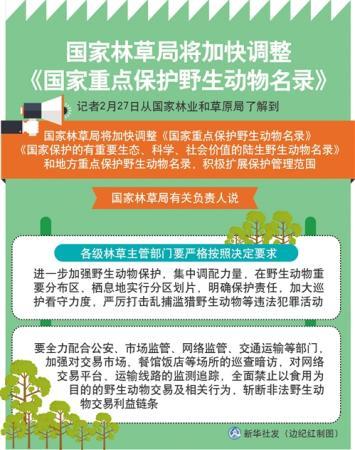In order to comprehensively ban illegal wildlife trading, not long ago, the "Decision of the Standing Committee of the National People's Congress on Prohibiting the Illicit Wildlife Trading, Eliminating the Abuse of Wild Animal Eating, and Safeguarding the Health and Safety of the People" was passed. It is also an animal. Why can't "game" be eaten, but domesticated?
In response, Zhao Xumao, a researcher at Lanzhou University, gave two examples: The familiar bats are not only the main host of coronaviruses, but also the natural hosts of many viruses, such as Ebola virus, rabies virus and Hendra virus. The types of bacteria and viruses carried by civet cats are also complex and diverse. It is the intermediate host of SARS coronavirus.
"Wild animals carry a lot of viruses. These viruses are safe from themselves, but sometimes they can cause major disasters for humans." Zhao Xumao said.
Of course, this does not mean that domesticated animals are virus-free and absolutely safe. According to Zhao Xumao, domesticated animals have a long history of dealing with humans, and humans have more protective measures. Compared with domestic animals, wild animals are more fragile. Large-scale consumption not only increases the probability of humans being infected with viruses, but also may cause their populations to become extinct, which may lead to a more serious ecological crisis.
There is a dilution effect hypothesis in ecology: the larger the group the individual lives in, the less chance each individual in the group will be hunted.
"Extending it into an ecosystem to maintain species diversity can reduce the risk of human infection." Zhao Xumao said that the higher the species diversity, the lower the risk of human, wild animal or domesticated animal infections. "Humans and wild animals, plants, and microbes are a community of shared destiny. Together, we form an ecosystem on Earth. Once the ecosystem is destroyed, it will endanger human health and safety.
What makes Xu Xumao somewhat worried is that the current unsustainable human activities are affecting the diversity of species at all levels. For example, overfishing and resource extraction will directly reduce the number of species and indirectly destroy their habitat. Taking non-human primates as an example, current unsustainable human activities are the main reason leading to the extinction of non-human primates, of which 60% of non-human primates are facing the threat of extinction, 75% of the population The number is decreasing.
"Wild animals and humans are both members of an ecosystem. They are the ecological great wall of human resistance to viruses. Not eating wild animals is critical to maintaining biodiversity and ensuring the safety and stability of the ecosystem." Zhao Xumao said.
Shen Hui

